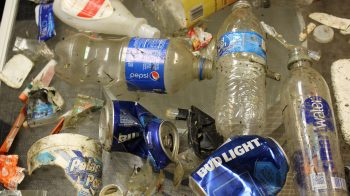Ditching the single-use water bottle
Every day at a sprawling Arrowhead bottle plant in Los Angeles, a towering yellow robot nicknamed “Apollo” grabs empty 5 gallon water cooler jugs from trucks, and sends them to refill stations under the watchful eye of technicians.
Those large office water bottles get tons of re-use, but most individual plastic bottles are only used once. How do we reduce that waste? San Francisco Supervisor David Chiu wrote legislation to limit single-use bottle sales on public property.
“People can still purchase single use plastic water bottle at their local grocery store or their corner store,” Chiu says. “But what we want to do is really ask residents in our city to think about changing their consumer behavior.”
A New York entrepreneur named Nan Harris hopes to change our water drinking habits with a vending machine called WaterStop Carts. After noticing the wastefulness of single-use bottles, she sold her co-op to finance a company to develop a more efficient technology.
WaterStop Carts – First Prototype from WaterStop Carts on Vimeo.
“Bottled water is just easier to find, that’s all there is to it,” says Harris. “So we developed the concept of accessibility through mobility.”
Harris’ sleek metal vending machine connects to municipal tap water, then runs it through filters like those at the giant bottled water plants. It also sells reusable bottles that collapse when not in use. Future versions will dispense another life-saving resource: wifi hotspots.
MIT students invented a similar machine called Refresh. It sells new bottles for $1.50, but refills are just 50 cents if you bring your own bottle.
Over in Los Angeles’ Koreatown, Richard Chin and his fiancee opened a water store called Alkasource. In a back room that looks like a science lab, they filter regular Los Angeles tap water into a bottle of your choice: plastic, glass, or metal.
“Once we started doing research about how water is sold, how water is produced and purified, we found that there weren’t that many resources for great quality water,” says Chin. “And so we decided to get into this business to provide the community with a source for very clean water.”
The International Bottled Water Association’s Chris Hogan acknowledges that lots of new eco-friendly options have popped up lately. “We have no problem with tap water, filtered water, using a reusable water bottle,” Hogan says. “The important thing is to drink water.”
The end result for consumers is more choice — from a bottling plant full of robots, to little machines that filter water right in front of you.
There’s a lot happening in the world. Through it all, Marketplace is here for you.
You rely on Marketplace to break down the world’s events and tell you how it affects you in a fact-based, approachable way. We rely on your financial support to keep making that possible.
Your donation today powers the independent journalism that you rely on. For just $5/month, you can help sustain Marketplace so we can keep reporting on the things that matter to you.

















